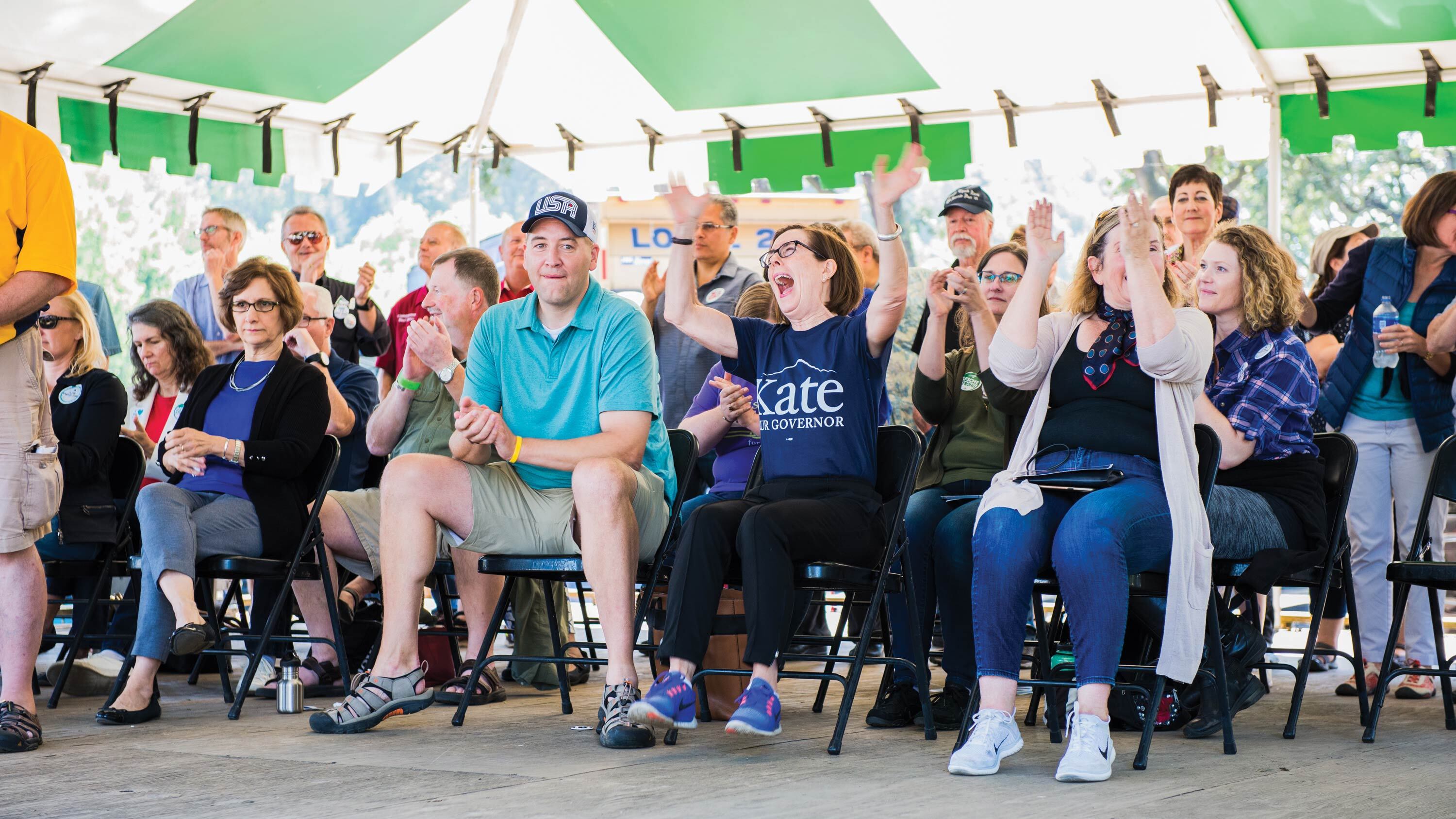Every Labor Day, Democratic elected officials and candidates gather at Oaks Amusement Park for barbecue, beers and a bevy of stump speeches to the members of public employee and building trade unions.
The event this year marked the unofficial kickoff of the fall election season and gave Democrats a chance to acknowledge the most influential and generous interest group in their party.
The picnic took place at a pivotal moment for both Democrats and their allies in organized labor. Both enjoy tremendous power in Oregon, and have a chance to increase that grip in November. But both groups feel threatened by larger right-wing forces. Unions have been weakened by a U.S. Supreme Court decision that allows members to stop paying dues, while Gov. Kate Brown is fending off a serious challenger and a slew of conservative ballot measures.
Here's what her remarks—and those of other Democrats—say about Oregon's political winds.

Brown is hearing footsteps.
The incumbent led off the festivities by accepting a $100,000 check from United Food & Commercial Workers Union Local 555. Even at this bluest of events, Brown appealed to the middle—echoing a strategy her general election opponent, state Rep. Knute Buehler (R-Bend), has used to narrow her lead in the polls.
"Are you ready to fight to elect a governor who can bring people together—Republicans and Democrats, urban and rural Oregon?" Brown asked the crowd. (They were.)

The day was defined in part by what wasn't said.
Notably absent from the event was Labor Commissioner Brad Avakian. Although his office is nonpartisan, Avakian is an ardent Democrat who will need a job when his term expires in January. But in August, Avakian filed a complaint against legislative leaders—his fellow Democrats—claiming they'd created a hostile workplace by not acting faster on sexual harassment allegations against former state Sen. Jeff Kruse (R-Roseburg).
Nobody mentioned Avakian or the discord his complaint poses. Instead, they espoused unity.
"Tomorrow is the beginning of the end of the Trump administration," said state Rep. Brad Witt (D-Clatskanie) "[And] the election of super-majorities in the Oregon Legislature and the re-election of our governor!"

Abortion analogies are awkward.
Senate Majority Leader Ginny Burdick (D-Portland) wanted labor to know that Democratic lawmakers are vigilant against the anti-union movement alive in other states and nationally.
"We killed local right-to-work bills before they could even get born," Burdick said.

Politics makes strange bedfellows.
No speaker came better prepared or spoke with more animation than Portland Mayor Ted Wheeler, who, as the Ivy League-educated scion of a storied timber family, is not an obvious labor ally. He's not on the November ballot but stumped anyway.
Wheeler reminded an indifferent crowd that as Multnomah County chairman, he'd led the first effort to "ban the box" to end discrimination against people with criminal records and that he'd recently incurred the wrath of President Donald J. Trump and U.S. Sen. Bill Cassidy (R-La.) for telling police not to intervene in an immigration protest unless there was imminent danger.
"Welcome to Portland, Oregon, where every day is a picnic and every day is Labor Day," Wheeler said.

Measures are on everybody's mind.
Several speakers, including Brown, voiced disgust with Measure 105, which would eliminate Oregon law that forbids local law enforcement from helping deport undocumented immigrants. The most prevalent yard sign being handed out at booths linked 105 to a quartet of conservative measures Democrats hope to defeat in November.
The other big measure—a $653 million affordable housing bond backed by regional government Metro—was mentioned mostly obliquely, by politicians who pledged to lower the cost of housing without talking taxes.
The exception: Metro President-elect Lynn Peterson, who made an impassioned pitch.
"This region is not affordable in any way, shape or form," Peterson said. "Do you all feel that?"

It's good to know your audience.
State Rep. Margaret Doherty (D-Tigard, Southwest Portland), a longtime teacher and Oregon Education Association member, stood in a line of House members onstage introducing themselves.
"Margaret Doherty, House District 35," she said. "I have been a union member for 49 years!" That drew loud cheers, but her record was quickly broken. "I love you guys," said state Rep. Jeff Reardon (D-East Portland), "and I've been a union member longer than Margaret Doherty!"

The stage was crowded.
The biggest drama of the heavily scripted hour of speeches arrived at the end—because of an internecine dispute between unions who are splitting their endorsements for Portland City Council.
City Council candidate Jo Ann Hardesty, who'd already won endorsements from Service Employees International Union, the American Federation of State, Municipal and County Employees, and the Portland Association of Teachers, sat forlornly at the back of the stage. Alone among dozens of candidates present, Hardesty was denied a chance to introduce herself because her opponent in November, Multnomah County Commissioner Loretta Smith, had won endorsements from trade unions that are part of the Northwest Oregon Labor Council, which organized the picnic and dictated who could give speeches.
"Apparently, the rules have been changed," Hardesty told WW shortly before 2 pm, when speeches were scheduled to end. "Just now, I was told I wasn't even supposed to be onstage. They are trying to stack the deck against me, but it isn't going to work."
It didn't. Throngs of Hardesty supporters waving signs forced the issue, and Hardesty got to say a few words.

Some things sound good—but aren't actually legal.
"You know what you get with Hardesty," she told her wildly cheering supporters. "I'm your woman. Vote early, vote often!"
